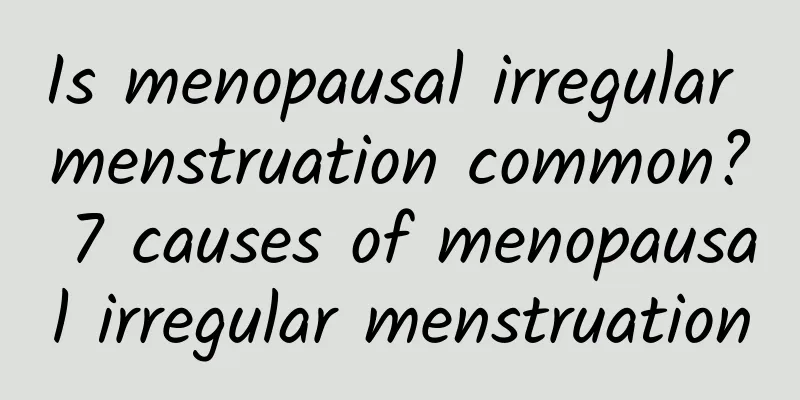Is menopausal irregular menstruation common? 7 causes of menopausal irregular menstruation

|
1. First of all, it is necessary to confirm whether it is amenorrhea or pregnancy. It is possible for women from adolescence to menopause. The decline of the ovaries after menopause is not a straight decline. Usually, menopause is completely achieved after a period of endocrine fluctuations. During this period, if sexual intercourse occurs, ovulation occurs accidentally, and pregnancy happens. It is not absolutely impossible. Abnormal pregnancy, such as early ectopic pregnancy or early miscarriage, will cause bleeding after a short period of amenorrhea. If it is not ruled out, it will be mistaken for menopausal dysfunctional uterine bleeding, which will delay the treatment of menopausal irregular menstruation or concurrent infection and aggravate the condition. 2. Menopausal irregular menstruation is caused by reproductive tract infection, whether acute or chronic, especially tuberculous endometritis, which often causes abnormal uterine bleeding. The causes of menopausal irregular menstruation in women also include if the functional layer of the endometrium is blocked, hindering the regeneration of the endometrium, and continuous bleeding or amenorrhea. 3. Submucosal uterine fibroids are prone to intermittent heavy bleeding, which is the cause of menopausal irregular menstruation. 4. The causes of irregular menstruation in menopausal women include functional ovarian tumors, such as theca cell tumors or granulosa cell tumors. Due to the large amount of estrogen secretion, it stimulates the proliferation of the endometrium and produces uterine bleeding with endocrine disorders. If postmenopausal women have such ovarian tumors, they will also experience uterine bleeding again. 5. The causes of menopausal irregular menstruation include endometrial cancer, irregular vaginal bleeding, especially long-term irregular bleeding and postmenopausal bleeding. This phenomenon of menopausal irregular menstruation in women should be taken more seriously. 6. Idiopathic thrombocytopenic purpura, leukemia, aplastic anemia and other coagulation disorders can manifest as uterine bleeding or menorrhagia. A routine blood test is required, including platelet count, coagulation and bleeding time. This is also the cause of menopausal irregular menstruation. 7. Another reason for menopausal irregular menstruation is cardiovascular disease. Women with high blood pressure or heart failure are also prone to uterine bleeding. Patients with liver disease are prone to bleeding. These all need to be checked. |
>>: Does abnormal bleeding mean irregular menstruation? 4 reasons for irregular menstruation
Recommend
Does spicy food help burn fat? ! Nutritionist: 4 tips to lose weight by eating spicy food
I believe that many of my friends like spicy food...
Causes and prevention of menopause
Women's aging and menopause are inseparable, ...
What are the methods for testing hyperprolactinemia?
What are the methods for checking hyperprolactine...
Is female cervical erosion easy to treat? Precautions for treating female cervical erosion
Is cervical erosion easy to treat? This question ...
Helps lose weight! Spicy coriander and black fungus detoxification and weight loss
[Black Fungus: Nourishes Yin and the Stomach + Re...
Only by exercising your core muscles can you lose weight all over your body! 6 highlights to create a vest line and beautiful legs
Do you also have the idea of "wanting to l...
What are the clinical symptoms of abdominal wall endometriosis?
Are there many clinical symptoms of abdominal wal...
Latest research: Long-term consumption of bisphenol A may lead to obesity
Modern people really have food concerns! Accordin...
What are the sequelae of ovarian cyst surgery? What are the symptoms of ovarian cyst?
What are the sequelae of ovarian cyst surgery? Wh...
What should be checked for pregnancy after missed abortion
Pregnancy after a missed abortion requires a seri...
How much can you eat during menstruation without gaining weight? Traditional Chinese Medicine teaches you how to lose weight during menstruation by promoting diuresis and removing dampness
There is a rumor on the internet: "Don't...
What are the symptoms of abnormal vaginal discharge? Excessive vaginal discharge or color changes
The main manifestations of abnormal leucorrhea ar...
What should I do if I find uterine fibroids? How should I treat uterine fibroids?
Uterine fibroids are more common in today's s...
What are the dietary principles for menopause?
Perimenopause is a normal physiological change. M...
How much do you know about the dangers of uterine fibroids?
Uterine fibroids, as the name suggests, are a typ...









